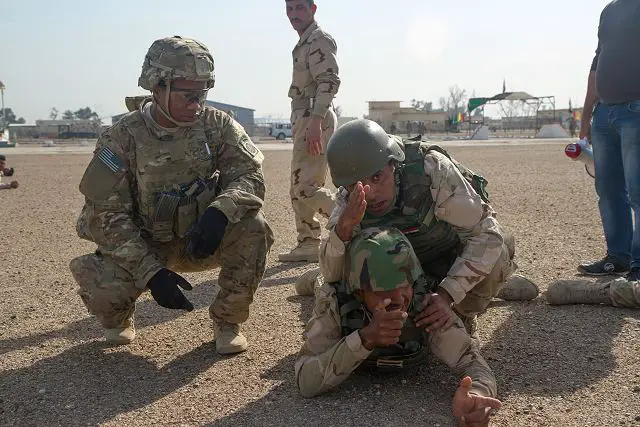The U.S. Army 82nd Airborne Division back in Iraq to train and assist Iraqi Security Forces 11611152
|
|
|||
|
Armies in the world - U.S. Army
|
|||
|
|
|||
| The U.S. Army 82nd Airborne Division back in Iraq to train and assist Iraqi Security Forces. | |||
|
Service members with the Iraqi Security Forces were glad to see the U.S. Army back in Iraq, said Soldiers with the 82nd Airborne Division, who recently returned from an advise, train and assist mission there. About 1,300 Soldiers with the 3rd Brigade Combat Team, 82nd Airborne Division, left the United States for Iraq in January of this year, and redeployed in October, following the short-notice nine-month deployment there in support of Operation Inherent Resolve.
|
|||
|
|
|||
 Iraqi army soldiers secure an area, during a assault an objective simulation, while an infantryman, with 2nd Battalion, 505th Parachute Infantry Regiment, 3rd Brigade Combat Team, 82nd Airborne Division, watches at Camp Taji, Iraq, March 3, 2015. Iraqi army soldiers secure an area, during a assault an objective simulation, while an infantryman, with 2nd Battalion, 505th Parachute Infantry Regiment, 3rd Brigade Combat Team, 82nd Airborne Division, watches at Camp Taji, Iraq, March 3, 2015. |
|||
|
|
|||
|
The Soldiers, part of Task Force Panther, provided advise and assist teams, trained Iraqi Security Forces, secured multiple critical facilities, and provided logistical support to further Iraq's efforts to degrade and defeat the Islamic State of Iraq and Syria, or ISIS. There will be other American teams that go in to perform the same advise and assist mission - including the 1st Brigade Combat Team, 10th Mountain Division who is there now - but the 3/82 was the first.
"I know the Iraqis were extremely grateful to see the U.S. troopers come back, in a new role and a new capacity," said Lt. Col. Bryan Babich, commander of 1st Battalion, 319th Airborne Field Artillery Regiment, Fort Bragg, North Carolina. Babich had been in Iraq before. He served there from 2005 to 2006 as a battery commander. "It was a very different mission in a very different time," he said. "I was in charge of a convoy security company and we'd move logistical convoys from one forward operating base to another. It was very tactical and very different." This time in Iraq, he said, he was tasked to the advise and assist team assigned to the Ministry of Peshmerga in Erbil, where he worked with Kurds, and also with coalition partners regarding how they trained and resourced the Peshmerga, ensuring, for instance, that as training occurred, a common standard was applied. "It gave me some pretty unique access and insight into the highest levels of Iraqi national political and military decision-making," he said. "I was able to provide reflections there and back to the coalition leadership." Sullivan said entering Iraq for the first time since 2011, it was a challenge to get the mission started - to get a foothold into what was expected of them and to what they needed to accomplish. "There was a lot we didn't know going into this mission," he said. "We had to define our own expectations and have them confirmed or denied once we got on site. One of the concerns we had was how our Iraqi partners were going to perceive us, having left at the end of Operation New Dawn, and what themes are they carrying, good or bad, that will inform our initial relationship. I was pleased to learn, and experience, that we were welcomed back with open arms." Sullivan said that as their mission solidified in Iraq, he saw that the Iraqis developed greater willingness to train with the Americans. He said he thinks what the 3/82 has done, and what follow-on units will do in the same mission, will help provide the Iraqis the space they need to defeat ISIS. "What we did creates time and space for Iraqis to achieve solutions to what is fundamentally a political problem in the theater and provided time and space for our own policy makers to define what our level of engagement and what our overarching goals are going to be, with regional partners, with coalition partners and with Iraqis," he said. |
|||


























